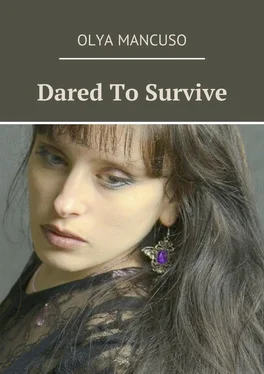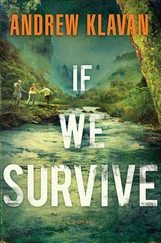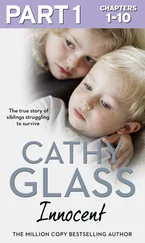Olya Mancuso - Dared To Survive
Здесь есть возможность читать онлайн «Olya Mancuso - Dared To Survive» — ознакомительный отрывок электронной книги совершенно бесплатно, а после прочтения отрывка купить полную версию. В некоторых случаях можно слушать аудио, скачать через торрент в формате fb2 и присутствует краткое содержание. ISBN: , Жанр: russian_contemporary, на английском языке. Описание произведения, (предисловие) а так же отзывы посетителей доступны на портале библиотеки ЛибКат.
- Название:Dared To Survive
- Автор:
- Жанр:
- Год:неизвестен
- ISBN:9785449097484
- Рейтинг книги:3 / 5. Голосов: 1
-
Избранное:Добавить в избранное
- Отзывы:
-
Ваша оценка:
- 60
- 1
- 2
- 3
- 4
- 5
Dared To Survive: краткое содержание, описание и аннотация
Предлагаем к чтению аннотацию, описание, краткое содержание или предисловие (зависит от того, что написал сам автор книги «Dared To Survive»). Если вы не нашли необходимую информацию о книге — напишите в комментариях, мы постараемся отыскать её.
Dared To Survive — читать онлайн ознакомительный отрывок
Ниже представлен текст книги, разбитый по страницам. Система сохранения места последней прочитанной страницы, позволяет с удобством читать онлайн бесплатно книгу «Dared To Survive», без необходимости каждый раз заново искать на чём Вы остановились. Поставьте закладку, и сможете в любой момент перейти на страницу, на которой закончили чтение.
Интервал:
Закладка:
I realized, then, that this would only happen if I stopped treating myself the same way my mother had. Instead of testing people in my life, I let go and granted people access. I decided that, even if someone let me down, I could handle it. I also decided to be open with new people who came into my life. I didn’t scare them off at the first encounter.
As relationships began to develop, I would explain how my past affected me, and how I’d chosen to move on and be happy. Almost everyone I opened to was completely supportive. Openness became a two-way street. I learned that most people had experienced their own struggles. Our confessions strengthened these new relationships.
I also learned that not everyone was someone I could open up to. But, the more I did it, the better instincts I had about who to let into my life. Taking risks with people is essential for happiness. After all, it is better to have experienced at least some loving friendships than to sit alone, fearing heartache. By loving myself, I allowed others to love me.
I love myself because I am still here. I can see my life changing around me. When I have moments of insecurity, I read through my journals, speak to friends, or throw myself into tasks I enjoy, like singing. Since changing my outlook, I have formed a number of great friendships.
The only thing I can give my mother credit for was making me courageous and independent. She didn’t intend to do this but because of my resilience I became a risk taker, willing to reach out to others in spite of the way she treated me.
Chapter Six.
Evil Girl
For some children, school might have seemed like a kingdom of joy and heaven where they played and socialized. But, not for me. My home life made me feel insecure, vulnerable, and anxious. This made me an easy target for bullies. They quickly smelled out my fears and my vulnerability. Bullies have radar for the weak link in any pack and I was it.
The first day I entered the school, I knew I would not fit in. The teachers saw me as a child from a dysfunctional family and quickly picked on me for all sort of things. In no time, I became unruly at school because I was unable to stay calm and tolerate the bullying and abuse from teachers and peers. They bullied me for all kind of different things, for anything they could find «odd» about me. They picked on the shabby, dishevelled way I looked. They picked on me because my mother sent me to school dirty. My parents could not afford «appropriate» clothes – or my mother chose to spend the money on my brother’s fine clothes. Everyone laughed at me and stated that I looked horrible and that my clothes looked too old, worn out and too «Soviet».
The «trendy» and «popular» girls wore clothes that were imported from other countries. «Olya, you look like a fucking shit,» my peers sneered, giggling at my embarrassment. «Your parents can’t afford to buy you „imported“ normal dresses,» they accused.
I would often see other girls in my class playing in our neighbourhood with others wearing pretty tops, real girly shoes, or nice trendy girly little dresses. I had nothing like this this. My mother and Dad and the whole family was always and forever focusing on paying my brother’s debts, the money he owed to people whom he was ripping off.
My mother insisted that I was entitled to nothing due to endless «hardships» and sorrows caused by my brother’s lifestyle. I always felt that I didn’t have the right to demand anything because my family’s life revolved around my brother’s life and problems.
I never felt like I fit in school. I was singled out. I attended school but did not listen and I behaved in an unruly fashion. It was a vicious circle. The teachers made me feel bad and inadequate because I was the «odd one» in class, the one who rebel1ed at everything. My behaviour was getting out of control. I rebelled against a system where I did not fit on.
Because I did not fit in and because I rebelled, I was treated badly by my peers and my teachers. This only accelerated my rebellious behaviour.
Mother was often invited to the school to discuss my «bad» behaviour. This infuriated her. At home, I was beaten and punished for this. But nothing helped. I continued to be unruly and the most terrible kid at school.
Public humiliation as a punishment was legal in Soviet Union schools and during the time I was raised. «Humiliation» involved being picked on and mocked and publicly shamed in the presence of our teenaged peers.
Also, teachers encouraged «good students» to publicly ridicule badly behaved students or academically weak students. Teachers encouraged good students to avoid playing with bad ones. The bad or weak ones were condemned to be outcasts, so they could feel it and suffer it. The moral point they tried to instil in me and those like me was that, if we want to be accepted by «normal» society, we must be like the «good» students.
The Soviet Union system of education believed that public humiliation would make unruly or weak children behave and study well. Their punishments had no positive permanent effects that we know of. Their punishments had many negative effects. It teaches violence, disrespect and degrading as an appropriate solution to problem solving. It teaches this lesson to the child being beaten or humiliated and to his or her peers even when the beating or humiliations takes place outside their presence. They feel it in the next room or down the hall. Cruelty is not mitigated by distance; the psychological harm is done to everyone in the class. Those lessons of violence are unfortunately well learned.
This kind of attitude adjustment – spare the rod and spoil the child—does not achieve the stated purpose of maintaining discipline. It treats the symptoms, not the underlying causes, of unruly behaviour.
This was a vicious circle with me. Each time I was humiliated publicly by teachers at school, the next day the form of my rebellion and protest was increased. As punishment escalated, so did my degree of acting out. It was always endless process of increased violence with no end and no beginning.
My behaviour was a cry for help. I wanted to scream out a message to the system I tried to fight. I just simply wanted to bring the point, so the teachers would come to realize that the use of corporal punishment, humiliations emotional ad verbal punishment was a failing practice.
The child displaying unruly behaviour is a child crying out, «Help me! Help me!» He or she may be ill, hungry, or physically or emotionally abused at home. This is exactly what was happening in my life. I just simply could not bring myself to behave better at school. I was never given any motivation to do so. What was the point?
Nobody believed in me. Nobody wanted to hang around me at school. Teachers and students practised abuse. The whole point was to make me feel unwanted and rejected for my bad behaviour. I simply had no logical reason to behave better.
The child like me comes to school and we ask him or her to be quiet, curious, and excited about learning. Unfortunately, such behaviours are foreign to the abused child’s. Unruly behaviour is a cry for help. My cry was never answered or understood by teachers. The law supported their psychological abuse inflicted on «bad» children.
As a teacher or parent, you cannot whip the hurt out of this child. His or her behaviour continues and worsens and leads to failure after failure. He or she grows to adulthood and becomes another of our modern and enlightened society’s losers – miserable, often criminal, and a burden to society.
I always knew that the teachers of Soviet Union schools – particularly the ones in my life – failed to control classroom behaviour.
Their use of abuse upon children was protected by the system. As the protest to their poor teaching methods and poor discipline strategies, I made myself a promise. One day I would become a teacher. I would take a stand against their primitive ways and prove them wrong by showing them that there are alternatives to the use of corporal punishment – alternatives that maintain classroom discipline and provide an environment for learning, a place for effective and rewarding teaching.
Читать дальшеИнтервал:
Закладка:
Похожие книги на «Dared To Survive»
Представляем Вашему вниманию похожие книги на «Dared To Survive» списком для выбора. Мы отобрали схожую по названию и смыслу литературу в надежде предоставить читателям больше вариантов отыскать новые, интересные, ещё непрочитанные произведения.
Обсуждение, отзывы о книге «Dared To Survive» и просто собственные мнения читателей. Оставьте ваши комментарии, напишите, что Вы думаете о произведении, его смысле или главных героях. Укажите что конкретно понравилось, а что нет, и почему Вы так считаете.












